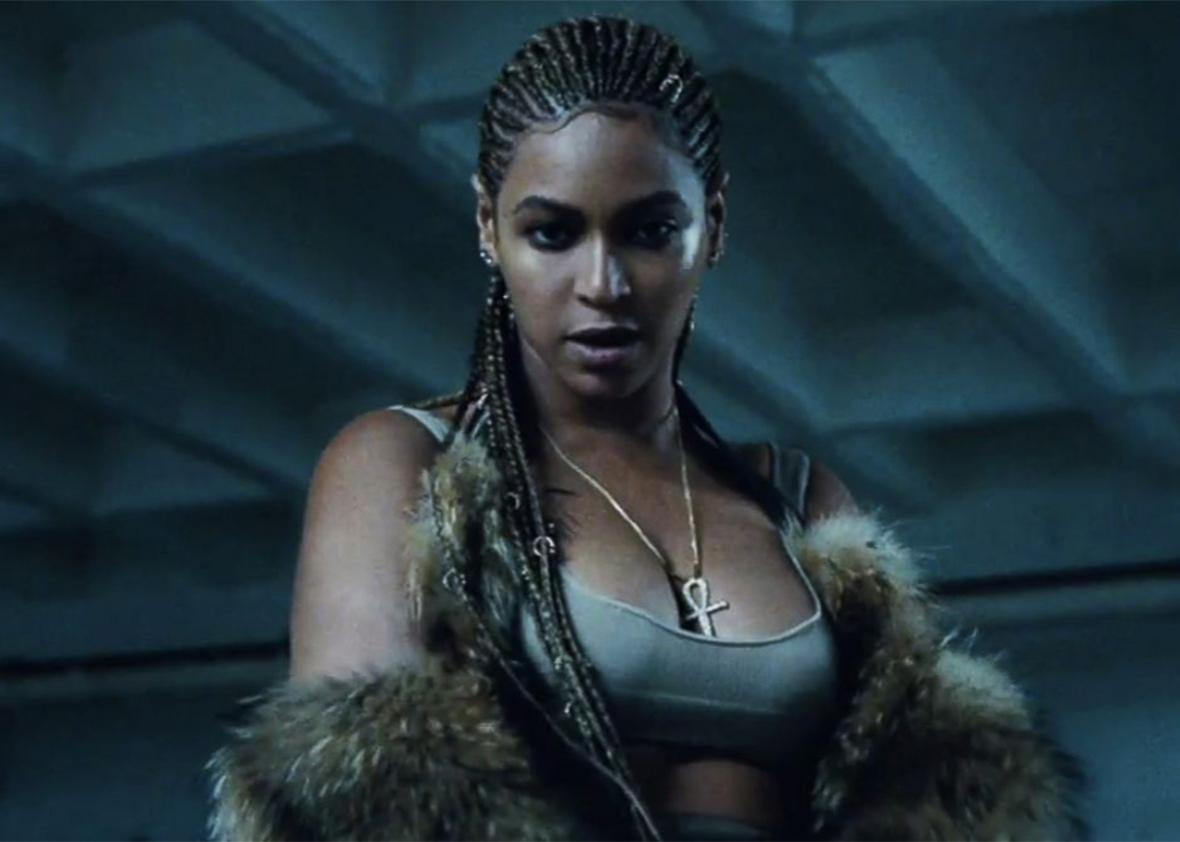The Mona Lisa is one of the greatest art works of Western civilization. But the sophistication of its brushstrokes is not the only reason it endures as a cultural icon. Freud speculated that Da Vinci was painting his own mother, who “possessed that mysterious smile which he lost.” Or was Mona Lisa a Chinese slave, or a self-portrait in drag? Just last week, yet another theory emerged: the image is based in part on Da Vinci’s male lover.
In other words, great art and juicy gossip are not mutually exclusive. This is one light in which to read Beyoncé’s Lemonade. The hour-long “visual album,” which hit HBO and the streaming service Tidal on Saturday night and immediately became the cultural story of the weekend/month/year, is absolutely a work of art. It is not a mere journal entry or a magazine interview; it’s a complex musical about monogamy that has been meticulously constructed with the help of dozens of artists and likely millions of dollars. It’s certainly about themes larger than Beyoncé—and yet, it is also so totally about her personal life.
The album tells the story of a woman grappling with her husband’s infidelity, moving through chapters with titles like “Intuition” and “Denial,” and ending with apparent reconciliation. Jay Z and the couple’s four-year-old child Blue Ivy appear on screen; it includes images from the couple’s quiet 2008 wedding, which they didn’t release photos of at the time. Lemonade practically begs to be read autobiographically, and as such, it is a master class in reputation management. Beyoncé planted enough seeds this weekend to keep the gossip industry drinking her lemonade for years. And somehow she did it without getting even a speck of dirt on her own hands.
When the album moved almost immediately from the arts section to the gossip pages, it was hard to imagine the pop star hadn’t planned it that way. On the track “Anger,” she sings, “He better call Becky with the good hair.” (The line instantly supplanted the Taylor Swift Tumblr meme “No its Becky” as the most important moment in 21st-century Becky-dom.) Hours later, fashion designer Rachel Roy posted a photo on Instagram with the tantalizing caption “Good hair don’t care, but we will take good lighting, for selfies, or self truths always.” Reading this as a confessional boast, the “Beyhive” swarmed the designer’s mentions with vitriol in the form of lemon and bee emojis. Roy, in turn, took her Instagram account private and tweeted piously about bullying. The episode is already spinning off into sub-narratives, like celebrity chef Rachael Ray getting caught in the crossfire.
And “Becky with the good hair” is just one line in one song! The album also seems to refer to her parents, for example. “You remind me of my father, a magician able to exist in two places at once,” she whispers at one point. “In the tradition of men in my blood, you come home at 3 am and lie to me.” (Matthew Knowles, who was divorced from Beyoncé’s mother in 2011, is rumored to have fathered at least two children outside his marriage.) And what are we to make of the fact that an album-length exposé of Jay Z’s cheating ways was first released on his own streaming service, Tidal?
Entertainers referring not-so-obliquely to their personal lives in their own work is commonplace, of course; in the modern tabloid economy, it’s practically a necessity. But Beyoncé is notoriously controlled on this front. Presumably, she cruises through life on a river of non-disclosure agreements. Her Instagram is flawlessly edited, and when she appeared on the cover of Vogue in September, she didn’t even grant the magazine an interview.
When the public doesn’t get the red meat it craves, it goes hunting. And so Beyoncé has been the subject of an unusual number of conspiracy theories for a pop star. Did she fake her pregnancy? Is her “sister” Solange actually her daughter? Is she older than she claims? Is she a member of the Illuminati? That last one is so persistent that Jay Z and Beyoncé have both addressed it in song: “I said I was amazing, not that I’m a Mason,” he rapped on the 2010 Rick Ross track “Free Mason.” “Y’all haters corny with that Illuminati mess,” she sneered in “Formation.”
Before this weekend, there was just one other time the public has gotten a juicier glimpse of what apparently happens backstage at Beyoncé, Inc. When a hotel employee leaked surveillance video of Solange attacking Jay Z in an elevator after the Met Gala in 2014, the grainy, soundless clip became a Zapruder film of the TMZ generation. But in retrospect, the paparazzi photos taken right afterwards tell a more interesting story. As the trio walks from the hotel to their cars, Solange glowers and stalks grimly ahead of the other two. Jay Z holds his jaw and looked stunned. Beyoncé, by contrast, betrays nothing of what just happened. Instead she looks right at the cameras and gives us a quiet, mysterious little smile.
